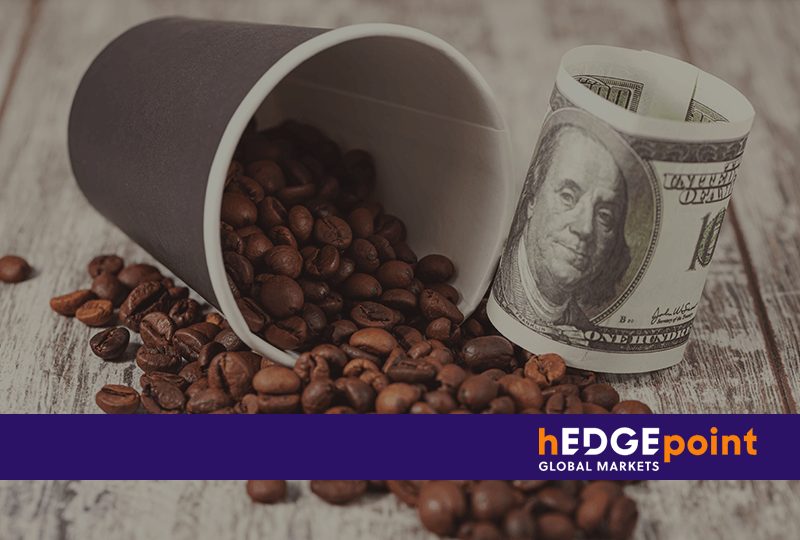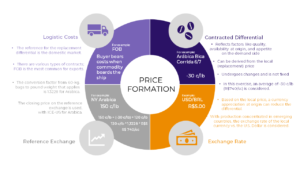
Before that delicious cup of coffee reaches your table, there’s a long process. Many aspects affect coffee prices, such as the dollar exchange rate, global

Before that delicious cup of coffee reaches your table, there’s a long process. Many aspects affect coffee prices, such as the dollar exchange rate, global economic policies, and climatic factors.
Knowing how the value definition of this commodity works can make all the difference for market negotiators, which contributes to making well-informed decisions.
After all, coffee is one of the products in greatest demand on the planet: its global consumption is expected to reach the equivalent of 170.3 million 60-kg. bags of coffee, between October 2022 and September 2023, according to the International Coffee Organization (ICO).
Are you curious about how exactly coffee prices are formed? Keep reading to find out!
When we talk about coffee, it’s important to remember that it’s a commodity produced on a huge scale by many different producers worldwide. A chain of national and international suppliers exists, involving complex dynamics.
The cost of coffee is influenced by numerous factors. We’ll highlight the main ones below.
The law of global supply and demand is determined by the relationship between the price of goods and services offered and the demand for them. In general, the greater the demand for coffee, the higher the price charged for it. On the other hand, the lower the demand, the lower the price. A balance is sought between the two to stabilize the value of coffee.
International exchanges are references for coffee pricing. For the price of arabica coffee, the New York Stock Exchange is the main source of prices. In the case of robusta coffee, the reference is the London Stock Exchange.
Producers need to spend on fertilization, inputs, management, and the use of technology to produce coffee. All these expenses affect the calculation of the price of this commodity.
The characteristics of the coffee traded also directly affect the price determination. Attributes such as origin, grain size, whether it’s arabica or robusta, certifications received, and traceability all contribute to defining the value.
Coffee stock levels lead to changes in price stability. Low inventories tend to make the market more sensitive to unforeseen events that affect supply, both locally and globally.
If stocks (national and international) increase and demand falls, prices also tend to fall about historical averages. However, if stocks are low and demand increases, then prices rise.
Climatic conditions, such as droughts and excessive rain, have an impact on coffee production in important producing regions. The consequences of these phenomena modify supply, which contributes to more price volatility.
A clear example of this: The global deficit in the 22/23 coffee harvest occurred mainly because of the decrease in production in Brazil, the world’s largest coffee producer, due to the adverse weather.
Read how climatic phenomena impact commodity production here.
As we mentioned, coffee is affected by international exchanges. Thus, it’s subject to the dollar exchange rate. If the dollar is high, coffee exporters are encouraged to sell more. The subsequent increase in supply tends to force prices to fall if demand doesn’t rise at the same rate as production.
Political and economic decisions, such as import tariffs, agricultural subsidies, and trade regulations, can all influence coffee prices. Geopolitical conflicts in coffee-producing countries may also disrupt supplies and affect prices.
Changes in consumer preferences for specific types of coffee, such as organic, contribute to changing prices for these specific varieties. The migration of consumption from arabica to robusta coffee also helps to explain the increase in production of the latter variety.
As we reached the end of the pandemic, people’s savings were depleted. Aid was also terminated, resulting in the deterioration in purchasing power as well as high inflation around the planet. Consumers started looking for cheaper coffee, requiring the adaptation of production to meet this demand.
Speculation in coffee futures markets leads to significant price swings as investors buy and sell coffee futures contracts based on expectations regarding price movements in the coming months.
Coffee prices involve the interaction of complex factors, such as the quality differences in the types of coffee, which aren´t fixed and are subject to change. For you to understand better how this value calculation is carried out, let’s look at an example that uses the average differential of a 6/7 type coffee spout (related to arabica):
New York Stock Exchange: 150.00
Differential (Average): -30.00
Conversion Factor: 1.3228
Dollar: R$5.0
Calculation: ((150 – 30) x 1.3228 x 5.0) = R$793.68
These costs also include logistical expenses and taxes for moving the coffee from the producing region to the port of shipment, and the origination of CIF and FOB prices:
On top of this, the values of the reference exchange, the exchange rates that relate the local currency to the dollar, and the contracted differential are all considered. This process reflects the aspects of quality, availability at origin, and appetite on the demand side.
Check out the following image for a detailed look at the relationship among the main factors involved in calculating coffee´s value:

You’ve probably noticed that the coffee market is subject to several factors that cause price volatility. Producers and traders need to be more aware of trends and movements to better manage risks.
hEDGEpoint offers special hedging instruments, such as the use of derivatives, and provides tools that help protect against volatility. Combining market intelligence and data analysis, we work with a multidisciplinary team that has extensive knowledge gained from working continuously in the commodities sector.
Talk to a hEDGEpoint specialist today to learn how we can help your business.

Rua Funchal, 418, 18º andar - Vila Olímpia São Paulo, SP, Brasil
Contato
(00) 99999-8888 example@mail.com
Section
Home
O que Fazemos
Mercado
Quem Somos
HUB
Blog
Esta página foi preparada pela Hedgepoint Schweiz AG e suas afiliadas (“Hedgepoint”) exclusivamente para fins informativos e instrutivos, sem o objetivo de estabelecer obrigações ou compromissos com terceiros, nem de promover uma oferta ou solicitação de oferta de venda ou compra de quaisquer valores mobiliários, commodity interests ou produtos de investimento.
A Hedgepoint e suas associadas renunciam expressamente a qualquer uso das informações contidas neste documento que direta ou indiretamente resulte em danos ou prejuízos de qualquer natureza. As informações são obtidas de fontes que acreditamos serem confiáveis, mas não garantimos a atualidade ou precisão dessas informações.
O trading de commodity interests, como futuros, opções e swaps, envolve um risco substancial de perda e pode não ser adequado para todos os investidores. Você deve considerar cuidadosamente se esse tipo de negociação é adequado para você, levando em conta sua situação financeira. O desempenho passado não é necessariamente indicativo de resultados futuros. Os clientes devem confiar em seu próprio julgamento independente e/ou consultores antes de realizar qualquer transação.
A Hedgepoint não fornece consultoria jurídica, tributária ou contábil, sendo de sua responsabilidade buscar essas orientações separadamente.
A Hedgepoint Schweiz AG está organizada, constituída e existente sob as leis da Suíça, é afiliada à ARIF, a Associação Romande des Intermédiaires Financiers, que é uma Organização de Autorregulação autorizada pela FINMA. A Hedgepoint Commodities LLC está organizada, constituída e existente sob as leis dos Estados Unidos, sendo autorizada e regulada pela Commodity Futures Trading Commission (CFTC) e é membro da National Futures Association (NFA), atuando como Introducing Broker e Commodity Trading Advisor. A Hedgepoint Global Markets Limited é regulada pela Dubai Financial Services Authority. O conteúdo é direcionado a Clientes Profissionais e não a Clientes de Varejo. A Hedgepoint Global Markets PTE. Ltd está organizada, constituída e existente sob as leis de Singapura, isenta de obter uma licença de serviços financeiros conforme o Segundo Anexo do Securities and Futures (Licensing and Conduct of Business) Act, pela Monetary Authority of Singapore (MAS). A Hedgepoint Global Markets DTVM Ltda. é autorizada e regulada no Brasil pelo Banco Central do Brasil (BCB) e pela Comissão de Valores Mobiliários (CVM). A Hedgepoint Serviços Ltda. está organizada, constituída e existente sob as leis do Brasil. A Hedgepoint Global Markets S.A. está organizada, constituída e existente sob as leis do Uruguai.
Em caso de dúvidas não resolvidas no primeiro contato com o atendimento ao cliente (client.services@hedgepointglobal.com), entre em contato com o canal de ouvidoria interna (ombudsman@hedgepointglobal.com – global ou ouvidoria@hedgepointglobal.com – apenas Brasil) ou ligue para 0800-8788408 (apenas Brasil).
Integridade, ética e transparência são valores que guiam nossa cultura. Para fortalecer ainda mais nossas práticas, a Hedgepoint possui um canal de denúncias para colaboradores e terceiros via e-mail ethicline@hedgepointglobal.com ou pelo formulário Ethic Line – Hedgepoint Global Markets.
Nota de segurança: Todos os contatos com clientes e parceiros são realizados exclusivamente por meio do nosso domínio @hedgepointglobal.com. Não aceite informações, boletos, extratos ou solicitações de outros domínios e preste atenção especial a variações em letras ou grafias, pois podem indicar uma situação fraudulenta.
“Hedgepoint” e o logotipo “Hedgepoint” são marcas de uso exclusivo da Hedgepoint e/ou de suas afiliadas. O uso ou reprodução é proibido, a menos que expressamente autorizado pela HedgePoint.
Além disso, o uso de outras marcas neste documento foi autorizado apenas para fins de identificação. Isso, portanto, não implica quaisquer direitos da HedgePoint sobre essas marcas ou implica endosso, associação ou aprovação pelos proprietários dessas marcas com a Hedgepoint ou suas afiliadas.
aA Hedgepoint Global Markets é correspondente cambial do Ebury Banco de Câmbio, de acordo com a resolução CMN Nº 4.935, DE 29 DE JULHO DE 2021, Artigo 14 do Banco Central do Brasil (BACEN).
Para mais informações sobre nosso parceiro, serviços disponíveis, atendimento e ouvidoria, acesse o link a seguir: https://br.ebury.com/